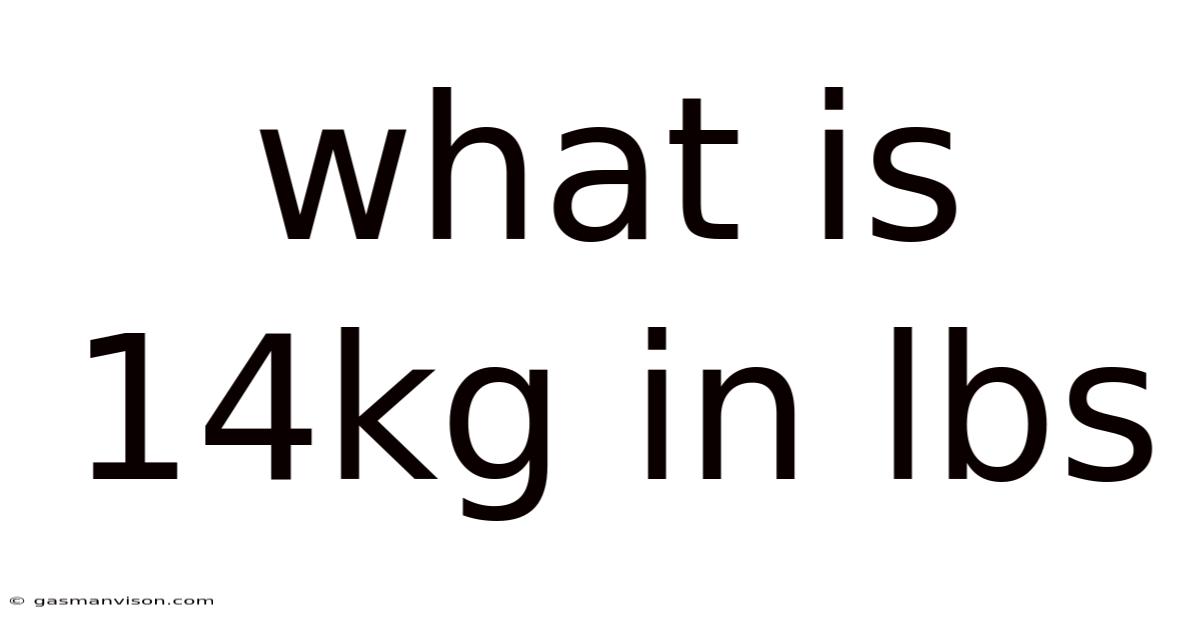What Is 14kg In Lbs
gasmanvison
Sep 14, 2025 · 5 min read

Table of Contents
What is 14kg in lbs? A Comprehensive Guide to Metric and Imperial Conversions
Knowing how to convert between metric and imperial units is a crucial skill in today's interconnected world. While many countries have officially adopted the metric system, the imperial system, particularly pounds (lbs), remains prevalent in several regions, leading to the need for frequent conversions. This comprehensive guide will delve into the conversion of 14 kilograms (kg) to pounds (lbs), exploring the methods, applications, and common scenarios where this conversion is necessary. We'll also examine the broader context of metric-imperial conversions and provide tips for accurate calculations.
Understanding the Conversion Factor: Kilograms to Pounds
The fundamental step in converting 14kg to lbs is understanding the conversion factor. One kilogram is approximately equal to 2.20462 pounds. This means that to convert kilograms to pounds, you simply multiply the number of kilograms by this conversion factor.
Calculating 14kg in lbs
To calculate 14kg in lbs, we multiply 14 by the conversion factor:
14 kg * 2.20462 lbs/kg ≈ 30.865 lbs
Therefore, 14kg is approximately equal to 30.865 lbs. You might often see this rounded to 30.9 lbs for practical purposes.
Methods for Conversion: Beyond Simple Multiplication
While simple multiplication is the most straightforward method, several other approaches can facilitate the conversion, particularly when dealing with multiple conversions or less common units.
-
Using Online Converters: Numerous online conversion tools are available. Simply input the value in kilograms, select the desired output unit (pounds), and the converter will instantly provide the result. These tools are convenient and minimize the risk of manual calculation errors, especially for complex conversions.
-
Using Spreadsheet Software: Spreadsheet programs like Microsoft Excel or Google Sheets offer built-in functions for unit conversions. These functions can automate the process and are particularly useful for performing conversions on large datasets or for repetitive tasks.
-
Employing Conversion Tables: Pre-calculated conversion tables provide a quick reference for common conversions. While less versatile than other methods, these tables are useful for checking your calculations or for quick estimations.
-
Dimensional Analysis: This rigorous method uses conversion factors expressed as fractions to ensure the correct units cancel out. For instance, to convert 14kg to lbs, you would set up the equation:
14 kg * (2.20462 lbs / 1 kg) = 30.865 lbs
This method is particularly helpful for more complex conversions involving multiple units.
Practical Applications: Where is this Conversion Useful?
The conversion from kilograms to pounds is frequently required in various contexts:
-
Shipping and Logistics: International shipping often involves specifying weight in both kilograms and pounds, necessitating accurate conversions to ensure compliance with regulations and avoid delays.
-
Food and Nutrition: Recipes and nutritional information may be presented using different unit systems. Converting between kilograms and pounds is essential for accurate ingredient measurements and dietary planning.
-
Travel: Luggage weight restrictions on airlines are typically expressed in kilograms or pounds, requiring travelers to understand the equivalence to pack efficiently.
-
Manufacturing and Engineering: Many industries use both metric and imperial units, necessitating accurate conversions for design, manufacturing, and quality control.
-
E-commerce: Online retailers often list product weights in both systems to cater to a wider customer base.
Understanding the Differences Between Metric and Imperial Systems
The difference between the metric and imperial systems stems from their fundamental units. The metric system, also known as the International System of Units (SI), is a decimal system based on multiples of 10. This makes conversions within the system remarkably straightforward. The imperial system, on the other hand, uses a more arbitrary set of units with less intuitive relationships. This difference contributes to the complexity of conversions between the two systems.
Potential Sources of Error in Conversions
While the conversion itself is relatively simple, errors can arise from:
-
Rounding Errors: Rounding off intermediate results can introduce small errors, particularly when performing multiple conversions.
-
Incorrect Conversion Factors: Using an incorrect conversion factor will lead to significant inaccuracies.
-
Unit Confusion: Mistaking kilograms for grams or pounds for ounces can result in large errors.
-
Calculator Errors: Entering values incorrectly into a calculator can also lead to mistakes.
Tips for Accurate Conversions:
-
Use precise conversion factors: Use the most accurate conversion factor available (2.20462 lbs/kg).
-
Avoid rounding during intermediate steps: Calculate using the full precision offered by your calculator.
-
Double-check your calculations: Verify your results using a different method or online converter.
-
Understand the units: Be certain about the units you're converting (kilograms, grams, pounds, ounces).
-
Use appropriate tools: Employ online converters, spreadsheet software, or dimensional analysis for complex conversions.
Beyond 14kg: Generalizing the Conversion Process
The process of converting kilograms to pounds remains consistent regardless of the initial kilogram value. You simply multiply the number of kilograms by the conversion factor (2.20462 lbs/kg). This principle extends to converting other metric units (grams, etc.) to their imperial counterparts.
Conclusion: Mastering Kilogram-Pound Conversions
The conversion of 14kg to lbs, approximately 30.865 lbs, is a fundamental example of a common metric-imperial unit conversion. Mastering this conversion and understanding the associated methods and potential sources of error is crucial in various aspects of daily life, academic pursuits, and professional fields. By employing the accurate conversion factor and utilizing suitable calculation methods, you can ensure the precision and reliability of your conversions, avoiding confusion and promoting clear communication across different unit systems. Remember to always double-check your work and leverage the available tools to enhance accuracy and efficiency.
Latest Posts
Related Post
Thank you for visiting our website which covers about What Is 14kg In Lbs . We hope the information provided has been useful to you. Feel free to contact us if you have any questions or need further assistance. See you next time and don't miss to bookmark.